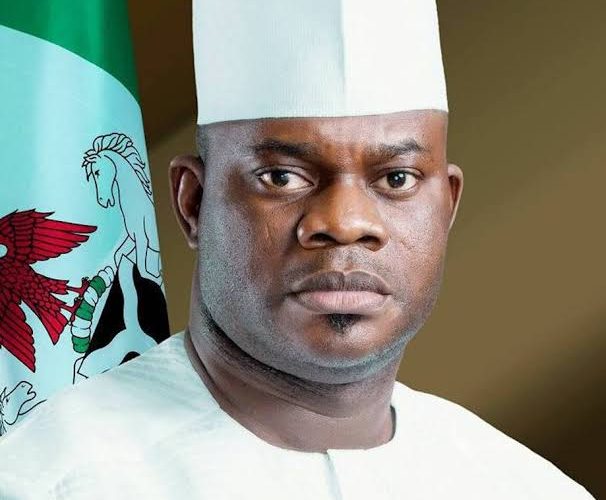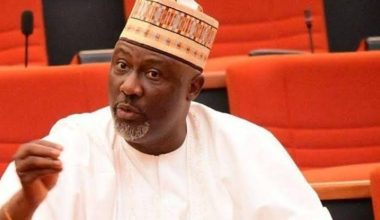By Isah Mubarak
As Governor Yahaya Bello concludes his tenure, it is fitting to reflect on the accomplishments and challenges of his era.
In the midst of uncertainty regarding the course of his “New Direction” administration, I candidly shared with a friend my desire to witness the restoration of the palace and the rehabilitation of roads in Ebiraland.
So, I will begin by commending Governor Yahaya Bello for his efforts, particularly the renovation of the Okene Central Mosque and the transformative rebuilding of the Ohinoyi of Ebiraland’s official palace. He took that palace from the depths of neglect, where it had succumbed and became a literal refuse dump, to what now stands as a symbol of dignity and grandeur.
I also appreciate the fact that he rehabilitated and constructed some of the road networks across Ebiraland. Not also forgetting the massive Reference Hospital and the Confluence University of Science and Technology, Osara (CUSTECH).
A notable aspect of Governor Yahaya Bello’s tenure is his commendable strides in promoting women’s inclusion in governance: 66 female Councilors, 21 female vice to the 21 LG Chairmen, 21 female Council Leaders, Female State University VC, Female ADC, Female HoS, SSG, SSA’s, etc.
I also appreciate him for the relative peace we enjoyed in Ebiraland and the security situation in the state in general.
Thank you.
That said, I also do not suffer from amnesia.
Governor Yahaya Bello started his tenure with the ill-fated worker’s screening, supposedly to sanitize the civil service. Despite the purported aim, it resulted in a grave aftermath—leaving workers unpaid for a distressing 15 months!
The repercussions were profound, with lives shattered, people dying, and survivors plunged into destitution. Our people, who were known for their pride, became beggars. Many never remained the same. I have family members and friends who were his victims. Till this moment, no one was held accountable for that disaster. He has neither acknowledged the suffering he caused, felt remorseful, nor even apologized.
During the same period, in his first tenure, we were in real-time, watching his cliques and cabinet members turn overnight billionaires. They brought the trend of demolishing and rebuilding houses, extensive property acquisitions in Ebiraland, lavish gifts to musicians and actors, and sponsoring local celebrities on pilgrimage. These actions unfolded amidst the stark backdrop of unpaid salaries and the consequential suffering and loss experienced by the people.
The unresolved issue of unpaid workers persisted even as Governor Yahaya Bello’s government received Paris funds and bailout funds. When pressed for an explanation on the allocation of these funds, the Chief of Staff, Onoja, reportedly provided a perplexing response, stating, “People have been asking of the Bailout Funds, the Paris Funds, and what they were used for. If you look around, you will see security vehicles, we bought over 150 of them,” but could not mention a single project or pay salaries.
And when, out of the goodness of his heart, he decided to pay, reports suggest that some were allegedly pressured into early retirement, while others had to forfeit arrears under unfavorable terms, ultimately receiving their dues in meager percentages. This practice became a grim norm during his tenure, with workers enduring the nightmare of receiving paltry sums, as low as N8,000, as their monthly salary. The protracted salary debacle persisted until the bailout fund of 2019, providing a semblance of relief for state workers, while the predicament lingered for local government workers.
Governor Yahaya Bello, in the last two years of his tenure, embarked on an endeavor to salvage his tattered legacy by executing projects and establishing two new universities. While some may argue for the necessity of these new institutions, I personally question the wisdom of creating more universities when existing ones, like PAAU, are yet to achieve standard status. Perhaps a more prudent approach would have been the decentralization of PAAU, redistributing faculties or appendages to various zones. The concern lingers about how long it will take for both CUSTECH and the newly established one in Kabba to attain standard status, considering the challenges faced by existing universities in terms of standards and funding.
Also, despite the touted achievement of improved security, it came at the price of heightened intolerance, with critics routinely picked and locked up. The electoral process also suffered, marred by imposed decisions and bloody elections. The instances of assassination persisted during his tenure, and allegations hinted at associations with known thugs.
Speaking of elections, during his 8 years, Bello NEVER had one single free and fair election. Even in primary elections, candidates were imposed. All positions in Kogi were his personal decisions and selection, not elections.
Governor Yahaya Bello’s high-handed approach reached a peak of intolerance when he split a road in half, a road that taxpayers’ money had funded and his administration had not built. Initially dismissed as unbelievable, the government later unabashedly claimed credit for this destructive act, revealing a troubling willingness to sacrifice public infrastructure for electoral gains.
On corruption, only God knows the magnitude of corruption that took place. If a man made a few selected individuals overnight billionaires and impoverished hundreds of thousands, by all measures, that person is a terrible leader. Notably, corruption cases involving his wife and nephew, totaling billions with the EFCC, provide a glimpse into a deeper and more pervasive issue—one that likely extends beyond the cases currently in public view.
In his first tenure, he was like a kid who was gifted a bicycle and had no idea what to do with it, a total absolute disaster. By the second tenure, when he knew what to do with it, he wanted to be the only one who owns a bicycle.
In his era, there was increased dependency our people have on political appointees before they can organize any programme, event, show, complete a project, or do anything noteworthy and this has rather given us setbacks on a lot of things than progress. It is sad we still don’t see that yet. We just have more people hoping to just be part of the government, and there is nothing more dangerous than a person whose livelihood depends on political deployments. A person who has no skills to be employed anywhere, who has no capacity to run a business, and whose ONLY way to survive is through political deployments. This breeds a precarious type of hustler, solely reliant on political deployments, highlighting the potential dangers inherent in showcasing wealth accumulation through politics.
Let me end this by saying, Governor Yahaya Bello saw Ebiraland as his personal fiefdom for him to do with as he pleases.
The governor’s evident pursuit of exclusive prominence led to a deliberate exclusion of capable individuals, allowing wealth accumulation for those around him but denying them political relevance. This pattern was reinforced by his tendency to appoint stooges and individuals lacking competence to key political positions.
Like Israel, he sees himself as God’s “chosen one,” and what happens when people view themselves like this is that they think they are above all laws, that they are invincible, and that they also have God’s blessing to do whatever they want and commit whatever atrocities they wish.
Farewell to His Excellency, Governor Adoza Yahaya Bello, a strong man, a detribalized leader, an uncompromising anti-democrat, a proper egomaniacal dictator, a narcissist with a touch of a god-complex.
Good riddance.


